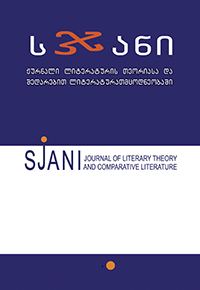რეპრესიული და თერაპიული დავიწყების მნიშვნელობა ზაირა არსენიშვილის „ვა, სოფელოში“
The Significance of Therapeutic and Repressive Forgetting in Zaira Arsenishvili’s “Oh, Life...”
Author(s): Salome PataridzeSubject(s): Language and Literature Studies, Cultural history, Theory of Literature, Politics of History/Memory, Georgian literature
Published by: ლიტერატურის ინსტიტუტის გამომცემლობა
Keywords: “Oh, Life...” by Zaira Arsenishvili; cultural memory; the era of totalitarianism;
Summary/Abstract: Zaira Arsenishvili, a Georgian screenwriter, musician and writer, notes in one of her interviews that it always surprised her that when reading Georgian literature of the 20th century, she could not find echoes of the horrific period of Georgian history - repressions – despite the fact that nearly every family in Georgia was directly or indirectly affected by repressions. Zaira Arsenishvili considered that repressions were the main theme of this epoch, and the reflection and reconstruction of repressions in fictional texts was a duty. Under totalitarianism, liberating power is embedded in cultural memory, and in these conditions, a collective identity can only be formed by separation from the possible oppressor, while literature plays the role of a medium of a collective memory in this process. According to Aleida Assman memory is always contracted as it relates to the perspectives and experiences of an individual or group. Placing something in memory is a valuable process, because it is the memory that creates community, but this process is impossible without forgetting. The function of remembering and forgetting is to subdue life. Aleida Assman distinguishes 7 forms of forgetting. The first three forms of these (automatic forgetting, kept forgetting, selective forgetting) are neutral, according to Assman, and serve as a mental filter. The fourth form - repressive forgetting (repressive vergessen) and the fifth one - defensive forgetting (defensive vergessen) have a negative connotation, because in their case, forgetting is an instrument to stabilize an aggressive totalitarian environment and repressive social climate. The last sixth and seventh forms of forgetting - constructive and therapeutic forgetting - are clearly positive and refer to forgetting the traumatic past (Assman 2018: 67-68). Damnatio memoriae condemnation of memory) is a form of repressive punitive forgetting which implies the symbolic destruction of the “enemy”, thereby destroying it. According to Assman, the condemnation of memory is a severe punishment because this act strongly affects and destroys a person’s existence. Those whose names have disappeared from the annals or have been removed from stone monuments, symbolically die a second time. In therapeutic forgetting, remembering is the cure to overcome the burden of history with recognition and remorse, and to leave it behind. It is important for reconciliation and social integration. A common violent history must be overcome, which will be made possible by remembering. Therapeutic forgetting has two phases: 1. Remembering 2. Forgetting. Out of these, remembering means collecting, processing and recognizing past events, while forgetting implies overcoming and distancing oneself for social peace and new beginning.
Journal: სჯანი
- Issue Year: 2022
- Issue No: 23
- Page Range: 133-147
- Page Count: 15
- Language: Georgian

